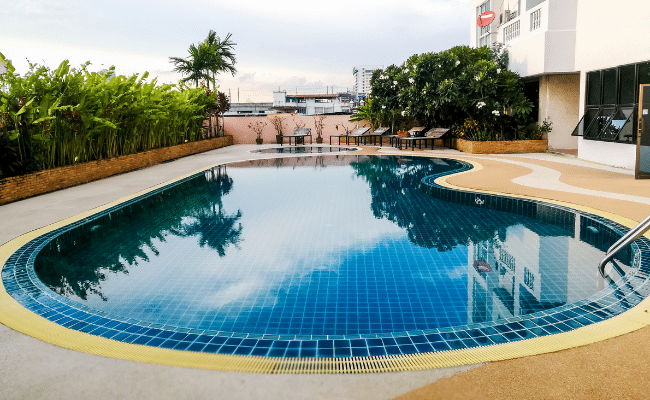
Table of Contents
Can you swim in a cloudy pool?
Swim in a Cloudy Pool, A cloudy pool isn’t good for two reasons. First, it’s not as sanitary as a clear pool, because you can’t see what kinds of dirt or contaminants might be floating in the water.
Second, you don’t really know whether the clarity of the pool is due to a lack of chlorine or a high concentration — and that means that you could get sick if you Swim in a Cloudy Pool.
If your local pool is cloudy after a storm, there are a few things you should do before going for a dip: check with someone who works at the facility (like a lifeguard) to make sure they’ve got it under control; wait until they take care of it, and definitely don’t go in if they tell you to stay out.
Any time there’s a large amount of dirt in the water, or if it looks like there’s not enough chlorine in the pool (smells like ammonia), it’s safer to wait until they take care of it before taking a swim.
Even though you may be tempted, never try to clean up your own pool! Not only is that much harder than you think — especially if you’re not sure how to do it properly — but accidental ingestion could make for an unpleasant day at work/school/errands.

Is it safe to swim in a cloudy pool?
For most people, a pool filled with cloudy water isn’t that big of a deal. They’ll jump in and swim, either oblivious to the fact that they’re swimming in murky water or thinking it’s not really bothering them.
But if you have an existing respiratory condition such as asthma, allergies or even a common cold, swimming in cloudy water may lead to trouble. The reason why involves your airways — specifically what happens when they swell shut due to some type of irritant, blocking off airflow for nearly 10 seconds at a time.
If you’ve ever had an allergic reaction while swimming in cloudy water, you know how uncomfortable it can be, but more importantly, you might also understand why clear water matters so much when it comes to safety.
Cut out the cloudy water, and you could cut down on your risk of having an allergic reaction.
For some people, it only takes one-time inhaling irritants in pool water to trigger a serious attack. That’s because when your airways are already irritated due to allergies or illness, swimming in even slightly cloudy water can cause them to swell shut pretty quickly.
This means you’re at risk for experiencing asthma symptoms if you’ve had problems with this condition before — which is why many people who have asthma opt to stay away from public pools altogether for this very reason.
You may also experience nosebleeds after or even during your swim, since the same things that are affecting your respiratory system are now irritating blood vessels inside your nose as well.
What happens if you swim in a cloudy pool?
What do you see in a cloudy swimming pool? Who knows? By the time you get in it, all the dirt and oils and sweat and chemicals and whatever else gets in there every day have already settled to the bottom.
Swimming pools, whether they’re private or public, rely on filtration systems that trap debris before water is emptied out and refilled with fresh H2O.
Usually, this happens after a swimmer reports some sort of problem (cloudiness, chemical imbalance, strong chlorine odor) — this isn’t a standard operating procedure for most pool owners/managers so most people would never find out what’s going on under their feet.
Have you ever seen an underwater camera installed in your local gym pool? There’s a reason for that.
There are three different types of pool filters: sand, cartridge, and Diatomaceous Earth. Each one works differently to filter out pollutants but they all have two things in common:
1) They’re placed at the bottom of the pool.
2) They’re designed to trap debris so that it doesn’t travel through your hair, skin, or eyes when you swim.

So, what happens if you swim in a cloudy pool? You get water up to your nose and into your lungs — not fun — or even worse.
you could contract some sort of infection from the contaminated water (a study last year found non-pool-related diseases like dysentery can be transferred by way of public pools).
And honestly, with chlorine levels around 0.6ppm, it’s a wonder anything dies in there at all, but the EPA says that anything over 4ppm can cause health problems for asthmatics and people with chemical sensitivities.
Are you going to get sick from swimming in a cloudy pool? Probably not, but if you find out your pool is dirty before you jump in — don’t do it! And if you’ve already done it? Soak your chlorine-soaked body in some bleach water next time [says Rachel!] or even try showering first.







